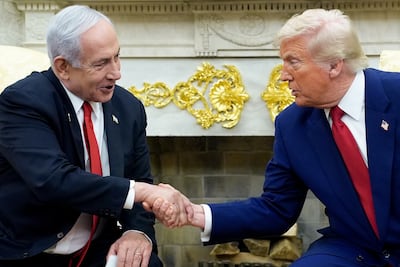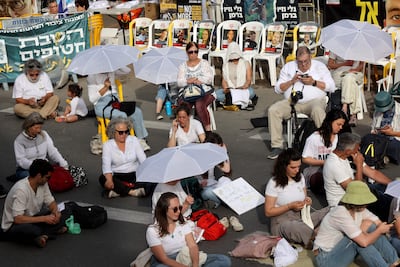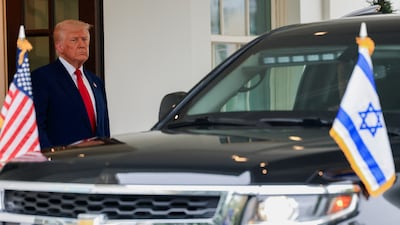At a long and rambling press conference with US President Donald Trump on Monday evening, Israeli Prime Minister Benjamin Netanyahu could do little more than sit in silence offering occasional gushing praise as Mr Trump fired off diplomatic plans for the Middle East, strong statements about tariffs and reminders of how much Israel needs his country.
Mr Netanyahu's government has made a sudden bid in recent days to end Israeli financial restrictions on US imports. But Mr Trump only responded with “maybe not” when asked in the Oval Office whether the US would reduce a 17 per cent levy slapped on Israeli products as part of sweeping tariff plans that have upended the world economy.
“Don't forget, we help Israel a lot. We give Israel $4 billion a year. That's a lot. Congratulations, by the way,” Mr Trump said. This came despite Mr Netanyahu promising to “eliminate” all trade barriers with the US during the meeting.
It was just one instance among many that turned Mr Netanyahu’s surprise White House visit, the second since Mr Trump came to office, into a far more complicated affair than the exchange of diplomatic pleasantries that the prime minister was hoping for, as he tries to boost his prestige at home while fighting a number of internal challenges. These include controversy over the sacking of a key internal security official, anger over the fate of Israeli hostages in Gaza and the lack of a state commission of inquiry into the October 7, 2023, Hamas attacks.

Mr Trump did have plenty of kind words for Mr Netanyahu and he reiterated his desire to forcibly depopulate Gaza and turn it into a real estate development, a policy that Mr Netanyahu and his far-right coalition strongly support.
“You know how I feel about the Gaza Strip,” Mr Trump said. “I think it's an incredible piece of important real estate. And I think it's something that we would be involved in. Having a peace force like the US there controlling and owning the Gaza Strip would be a good thing.”
Dmitri Diliani, a member of Palestinian faction Fatah’s revolutionary council, said the latest expression of Mr Trump’s support for the Gaza plan would lead to “nothing short of a structural transformation of the besieged strip into a network of de facto concentration camps”.
“This plan embodies the physical implementation of a brazenly declared policy of ethnic cleansing, executed with impunity by a settler-colonial regime emboldened by unwavering American support,” Mr Diliani said.
Mr Trump also expressed solidarity with Israeli hostages held by Palestinian militants in Gaza. Many of the Israeli public believe their government is not committed enough to securing the release of the captives despite a majority wanting them home above all else.
Mr Trump said releasing hostages was “a long process” but also that he wanted the Gaza war to end, despite Israel walking away from a ceasefire deal in March and massively increasing its bombardment of the enclave.
“I'd like to see the war stop, and I think the war will stop at some point, that won't be in the too-distant future,” Mr Trump said.
In a worrying development for Mr Netanyahu, Mr Trump also had kind words for Turkish President Recep Tayyip Erdogan, who just over a week ago asked God to “damn Zionist Israel”.
Turkey-Israel relations have been deteriorating throughout the Gaza war, and after the fall of former Syrian president Bashar Al Assad, Israel is worried about Turkish plans to expand its influence in the country, which shares a long, restive border with Israel.

“I have great relations with a man named Erdogan. Have you heard of him? I happen to like him and he likes me,” Mr Trump said.
Mr Trump congratulated Mr Erdogan for being “very smart” and doing “what nobody has done in 2,000 years, taking over Syria”. Turning to Mr Netanyahu, he said: “Any problem that you have with Turkey, I think we can solve, as long as you are reasonable, you have to be reasonable.”
There was also the revelation that the US was holding talks with Iran on its nuclear programme. “We have a very big meeting, and we’ll see what can happen. And I think everybody agrees that doing a deal would be preferable,” Mr Trump said.
Iran’s foreign minister confirmed on Tuesday that senior representatives from both countries would meet on Saturday in Oman, although he said the talks would be “indirect”.
Preventing Iran obtaining a nuclear weapon has been one of Mr Netanyahu’s key priorities throughout his long career as Israeli leader, and Mr Trump’s stated preference for “diplomacy” will have caught Israel’s attention, where many favour a military operation with essential help from Washington to end Iran’s nuclear ambitions.
Israeli journalist Anshel Pfeffer, who wrote a biography of Mr Netaynahu, posted on X that the meeting was “peak humiliation” for the Israeli Prime Minister.
“Trump isn’t treating Netanyahu like he did [Ukraine President Volodymyr] Zelenskyy in the White House but in many ways this meeting is even more humiliating. He’s not demanding Israel act like America’s vassal state, he’s assuming it already is,” Mr Pfeffer wrote. “As one Israeli official just described it to me, 'Netanyahu is the first Israeli prime minister to give America total control over its foreign policy. Israel’s foreign policy is now whatever Trump says it should be'.”


